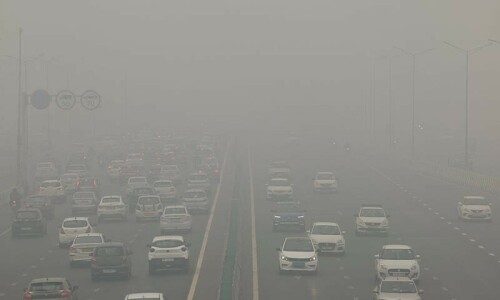THERE are reports in the US media that the US government is mulling over the possibility of conducting strikes and troops incursions inside Pakistan. There is a belief that this will happen if the latter fails to start operations in North Waziristan as per America's dictates.
Although the US government at times denies such reports, the stark warning issued by US Secretary of State Hillary Clinton — when she stated that if a Faisal Shahzad-type incident in America was traced to Pakistan there would be dangerous consequences for the country — should not be taken lightly.
Since our government has no control over the activities of US citizens of Pakistani origin, it needs to take the threat seriously. Another dangerous insinuation by Ms Clinton was that mid-ranking officers in the Pakistani government knew the location of Osama bin Laden, Ayman al-Zawahiri and Mullah Omar inside Pakistan. She wants to shift the responsibility of the last eight years' failed US war in Afghanistan to Pakistan.
What can be these dangerous consequences mentioned by the US secretary of state? These can range from economic sanctions, air strikes inside Pakistan, cajoling India to undertake incursions inside Pakistan and conducting US Marines attacks inside Pakistan among other options. The US must have worked out a plan against Pakistan. The Pakistan Army being a professional army must or should also have worked out a counter-response. If so, a statement by our Foreign Office to the effect that Pakistan being an ally of US in this war on terror would never want a war with the US, a superpower, but that if the US insists it would find Pakistan ready for the consequences, would be in order.
But what worries the common man is that the response from the government has been extremely muted. Does that mean that Pakistan will take such aggression lying down? Has the government minutely examined these threats?
Sanctions are an old story and we have been through it many times. Pakistan has a large black economy which is probably the size of the official economy so that sanctions would not hurt the common man. Its major impact will be felt in the lack of spare parts for equipment from the US for our armed forces.
From the point of view of military strategy it is common practice to study the vulnerabilities of the enemy and make plans to accentuate these, as it is to consider one's own strong points and build upon these. The US has a large number of troops in Afghanistan that are dependent for logistics on Pakistan. The US is also vulnerable in the sense that it can't sustain a large number of casualties because of its domestic politics. Besides its diplomatic staff, the US has some personnel in Pakistan under the garb of training and intelligence-sharing teams and contractors, auditors and streams of visitors in connection with aid programmes.
The Americans have a base at Shamsi in Balochistan. They also have had agents recruited in our bureaucracy, among our politicians, in Fata and, perhaps, even in the armed forces. The US is presently interested in strengthening its intelligence-sharing teams in Peshawar and Quetta. The government and the army must study all this and politely but firmly decline all those requests (read demands) which are detrimental to our national security.
The US defeat or, to put it in more euphemistic terms, failure in Afghanistan is a foregone conclusion. The question is only whether the Americans will be able to beat an orderly retreat and manage an honourable exit or be caught up in a Vietnam-like situation. We should be looking at a post-US withdrawal scenario in Afghanistan and also analyse how to protect ourselves in this process of withdrawal in view of Ms Clinton's statement and the US media's insinuations.
Let's be frank with ourselves the US is no friend of Pakistan or Afghanistan or for that matter of the Muslim world. And anyway we have to see to our national interests which guide the country's policies. We should shun wishful thinking and pretensions. Mr Obama's latest strategic thoughts consist of some very noble ideas and sound concepts but will the US establishment implement these in letter and spirit? One appreciates the US president's vision but one is not confident that he can act upon these given the present environment.
If the US carries out its threats against Pakistan as postulated by Ms Clinton then Pakistan would be the third Muslim country in a row after the invasion of Iraq and Afghanistan to have been affected in a similar manner. What will be the reaction of the Islamic world? Mind you, Pakistan is the only Muslim nuclear state.
The writer is an ex-brigadier who was formerly Fata secretary and home secretary Khyber Pakhtunkhwa.
mahmoodshah@mahmoodshah.com












































Dear visitor, the comments section is undergoing an overhaul and will return soon.